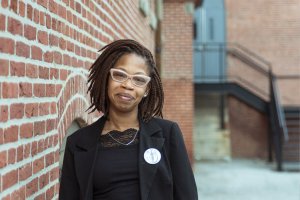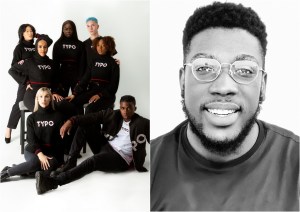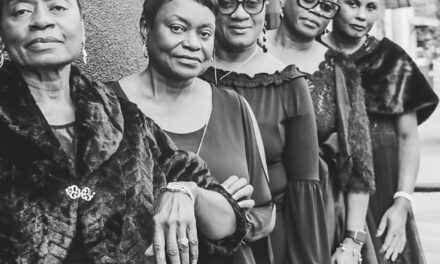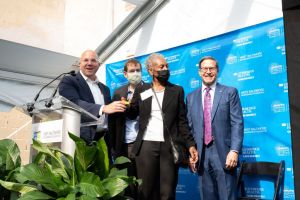
By Catherine Pugh,
Special to the AFRO
As we focus on the change makers and thought leaders continuing the work of Martin Luther King Jr., the AFRO would like to salute the work of Nicole Hanson-Mundell, the executive director of Out for Justice. Recently, the Baltimore native sat down with the AFRO to discuss her life, the organization’s priorities for the 2023 Maryland legislative session, and the work they have been doing over the past five years under her leadership.
Out for Justice is the policy arm for the re-entry community in the state of Maryland . After receiving its nonprofit status in 2012, the organization has been actively working to make life less challenging for the formerly incarcerated.
Highly recognizable in Annapolis, as their members walk the halls daily during the session, they hold rallies and can be heard testifying and advocating for legislation they believe makes transition for returning citizens easier. There is no shortage of individuals for them to advocate for—Maryland has one of the highest incarceration rates in the country, and the highest rate nationally for Black males.
A 39-year-old advocate, Hanson-Mundell is no stranger to the experience of incarceration. “We are policy advocates that do everything we can to change antiquated laws, make law and modify laws in Maryland that make it almost impossible for returning citizens to live a quality life,” she said.
“In Maryland, we lobbied and helped return the right to vote to returning citizens. People still don’t know that in Maryland you can vote if you have a record, and you can vote if you are sitting in jail or prison waiting for a trial and have not been found guilty or not guilty. During this past election we traveled from jurisdiction to jurisdiction, prisons and jails making sure people voted. We took in absentee ballots,” said Hanson-Mundell.
A strong advocate for just policies
Nicole’s introduction to Maryland politics and policy began in 2006 when she campaigned for the Martin O’Malley-Anthony G. Brown ticket for governor and lieutenant governor, respectively. Over the years, she picked up strong female mentors who would encourage and shape her work and approach to making change.
“I worked with young people teaching them how to go door-to-door. They faced a lot of racism, and I would have to reassure them that they were OK. I also encountered Mary Washington, an openly gay woman, who knocked on my aunt’s door asking for support. I was intrigued by her message and joined her on her campaign trail,” said Hanson-Mundell. “She didn’t win that time but did win the following state election. I also worked for [State] Senator Jill Carter when she campaigned for mayor, and she campaigned and transitioned into her legislative liaison. I say I got my strategic thinking from now-Senator Mary Washington, and boldness from Senator Jill Carter.”
For several legislative sessions Nicole worked for State Delegate Jill Carter, alongside Caryn York, who is now in New York heading the Women’s Prison Association.
“She was their policy person—I learned how to be a strong advocate for just policies,” Hanson-Mundell said of working with Caryn York. “There weren’t many Black women like us walking those halls.”
Nicole, however, said when you work for politicians your life becomes theirs. She had to figure out what she wanted for herself.
Becoming a voice for incarcerated women
Nicole’s life has taken a few twists and turns, she explained.
“I was feeling the pressure of the adults I was around in Annapolis talking about the college they had attended. You’ve heard about peer pressure? Adult pressure is real. After eight years in Annapolis and working a full-time job as a nursing assistant at the Veterans Administration hospital at night, I asked my then-boyfriend and father of my child– now my husband– if I could quit my job and go back to school. And he said yes,” said Hanson-Mundell.
“For some reason I could not trust that a man could provide for us. I needed to contribute,” the policy advocate said. “I wanted to continue having the things I had when we were both contributors to the household. I had enrolled at Sojourner Douglass College and couldn’t concentrate. I was hearing the rumblings about the problems Sojourner was having. I watched students transferring to other colleges and I did not react until I realized I had lost the credits I had accumulated.
“I spiraled and found myself caught in the criminal justice system for minor offenses that led to nine months of incarceration,” said Hanson-Mundell. “What I saw there made me realize that women who didn’t deserve to be there, did not have a voice or means to advocate for themselves. I vowed that when I was released that those walls would never see me again, and that I would be the voice for them—advocating for fairness.”
Hanson-Mundell spoke of the added burden that comes with incarceration as a mother.
“When you incarcerate a mother, you stifle everything around them—their children and the family,” she said. “Every offense does not deserve a prison sentence and everyone leaving the system deserves an equal opportunity to live a productive life.”
When she returned home, Hanson-Mundell reached out to several people she had worked with. It was Caryn York who responded. “Caryn said, I have just the place for you.”
Out for Justice was just starting up as an advocacy group and Hanson-Mundell joined as a volunteer and then eventually became an unpaid board member. She found an opportunity that was provided through the Obama administration, employing previously incarcerated unemployed, until York helped her get a salaried job. The Greater Homewood Community Organization was operating an America Vista program that hired returning citizens.
“There were 10 of us working there in the basement building a program and were vying to lead the open table model,” Hanson-Mundell recalled.
Ultimately, she was selected as the leader for the program model, which worked closely with returning citizens as they navigated their way back into society. The program would secure transportation for clients, help them fill out applications and access resources they needed to successfully re-enter the community.
Hanson-Mundell continued to volunteer with Out for Justice, and five years ago she became its executive director.
“My greatest challenge is managing the nonprofit industrial complex. What I mean is, as a leader I must be strategic– data keeping, and tracking our progress is important to our funders,” she said.
The structure of the organization is sound. There is an accountant, attorney, chief operating officer and a full staff.
“My greatest challenge is being my authentic self, in an unauthentic world,” Hanson-Mundell said. “My greatest accomplishment has been stabilizing funding for our organization and being able to hire formerly incarcerated people.”
“We don’t get a lot of local funding,” she noted. “There are groups that did not believe we would still be around.”
Indeed, Out for Justice gets its most substantive support from the Oprah Foundation and Meyers Foundation, and Open Society Institute has been funding Out for Justice since it started nearly 12 years ago.
Mission: engage, educate, empower
Out for Justice started as a grassroots organization with a mission they continue still today. Members of th organization still follow through on what Hanson-Mundell calls the three E’s:
“We engage formerly incarcerated individuals, families and friends through grassroots outreach and community events. We educate our member base and communities on the policies and practices impacting our communities and navigating the legislative process for reform. And we empower those impacted by the criminal legal system to utilize their voices and experiences to enact tangible change. This mission is on our website,” she said.
As she moves into 2023, Hanson-Mundell said, the group has a well-defined set of objectives:
“This session of the Maryland General Assembly we will be advocating for a brick-and-mortar building just for women returning from incarceration, to be able to get the services and support they need. Also, we have too many laws on the books that are unjust and need to be repealed. For every proposed change into the law, we will be calling on lawmakers and partners to include specific timelines, oversight processes, accountability measures, and necessary budgetary allocations,” she said.
Out for Justice continues to educate its membership and the community on how the system of justice can be reformed and what requires legislation.
“We will continue to hold rallies, and meetings with our legislators, to help us meet our objective of a fairer justice system,” she said.
When asked where she sees herself in the next five years, Hanson-Mundell, one of Baltimore’s strongest agents of change is very clear:
“I would like Maryland to establish a statewide Maryland re-entry office, and I want to be the first director.”
Help us Continue to tell OUR Story and join the AFRO family as a member –subscribers are now members! Join here!
The post Out for Justice: how one Baltimore organization is making change for returning residents appeared first on AFRO American Newspapers .











